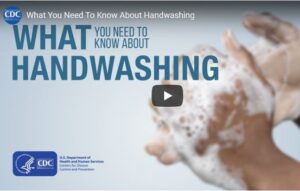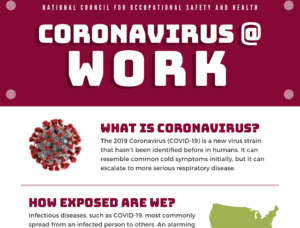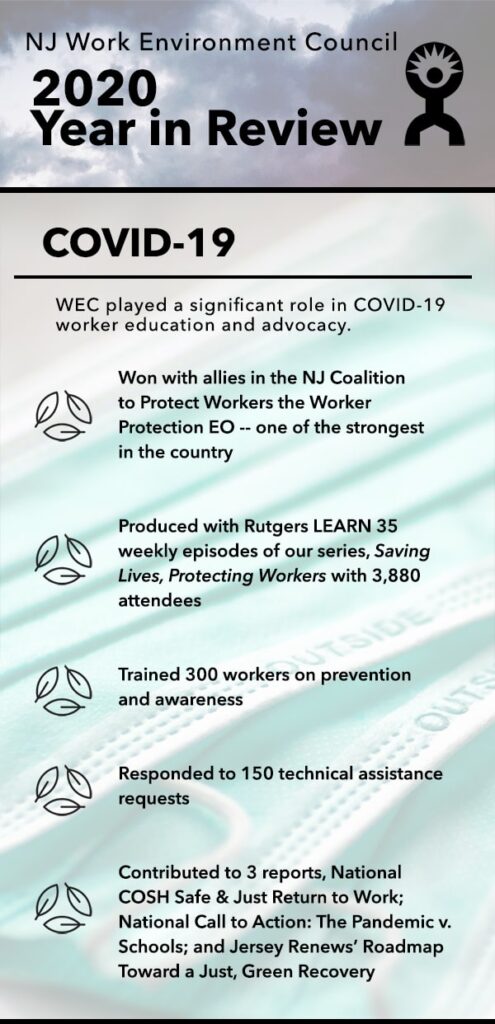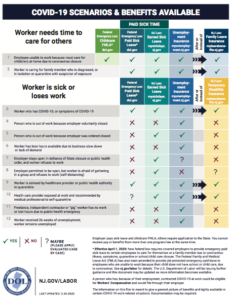COVID-19 Resources
What is COVID-19?
The most recent coronavirus, COVID-19, is a new strain of virus that hasn’t been identified before in humans. The COVID-19 virus is a respiratory pathogen that is highly contagious, and it is far more lethal than the flu virus.
Some symptoms of coronavirus include – fever, cough, body aches and tiredness and they can worsen and cause pneumonia, fluid in the lungs that leads to shortness of breath. The COVID-19 illness is more severe than the flu, and the chance of dying from it is greater than the seasonal flu, estimates up to 30x greater risk of death. COVID-19 has been able to spread from person to person very easily and requires an immediate response to protect workers and the general public.
The best way to prevent illness is to avoid being exposed to this virus. Some recent studies have suggested that COVID-19 may be spread by people who are not showing symptoms. The virus is thought to spread mainly from person-to-person, between people who are in close contact with one another (within about 6 feet), through respiratory droplets produced when an infected person coughs, sneezes or talks because these droplets can land in the mouths or noses of people who are nearby or possibly be inhaled into the lungs.
Protect Yourself!
Steps to Take to Protect Yourself
Below are some steps you can take to protect yourself at work or in your daily life. This is not a comprehensive list. It is important to note, as more is learned about COVID-19, the Center for Disease Control and Prevention (CDC) continues to update their guidance on how to protect yourself. For the most recent updates, visit the CDC website.
- Wear a mask to protect yourself and others and stop the spread of COVID-19. Wear your mask over your nose and mouth and secure it under your chin. Fit the mask snugly against the sides of your face, slipping the loops over your ears or tying the strings behind your head.
- Stay at least 6 feet (about 2 arm lengths) from others who don’t live with you.
- Avoid crowds. The more people you are in contact with, the more likely you are to be exposed to COVID-19.
- Avoid poorly ventilated spaces.
- Wash your hands often. If soap and water are not readily available, use a hand sanitizer that contains at least 60% alcohol.
- Monitor health daily.
- Get Vaccinated to Protect Against COVID-19
- Clean and disinfect objects and surfaces you touch often. Use cleaning products as directed.
Employers should follow the MOST protective guidance and standards issued by state or federal agencies. If guidance contradicts each other, the MOST protective should be implemented.
COVID-19 Weekly Updates: Saving Lives, Protecting Workers
In this weekly series, we will hear from and talk with public health experts, government officials, medical personnel, front-line workers and worker representatives about the latest developments in the fight against COVID-19. The series is sponsored by WEC, Rutgers Learn and Jersey Renews and airs on Tuesday @ 12pm. Want to receive weekly series emails, sign up here.
Past Webinar Summaries
April 20: COVID-19 and the New Housing Crisis
Today’s webinar explored how COVID-19 has worsened a pre-existing housing crisis in New Jersey, what protections exist for New Jerseyans struggling to pay rent, and what policies we need to prevent post-pandemic evictions and guarantee secure, affordable housing for all.
Eric Seymour, Assistant Professor of Urban Planning and Policy Development at Rutgers’ Bloustein School of Planning and Public Policy, shared context on the relationship between income loss throughout the pandemic — particularly severe for those employed in the service sector — and inability to make rental payments. Recent research showed that New Jersey tenants indicated the highest rate nationwide of “no confidence” […]
March 30: COVID, Immigration Status, and Hazardous Working Conditions
This week’s webinar focused on how COVID-19 has impacted undocumented workers, the risks that undocumented workers face when they organize against unsafe conditions, and how workers are fighting back despite threats of retaliation. More than 40 people attended this webinar.
Vineeta Kapahi, Policy Analyst with NJ Policy Perspective, offered context for why COVID-19 has hit undocumented New Jerseyans particularly hard. Undocumented workers make up a large portion of the workforce in industries deemed essential during the pandemic, and many have been forced to work in unsafe conditions, particularly in sectors already governed by poor or poorly enforced labor protections such […]
March 16: COVID-19 and Paid Time Off for New Jersey Workers
We were joined by guests from the Center for Women and Work at Rutgers SMLR and the New Jersey Citizen Action Education Fund to learn about how paid time off intersects with community health and well-being – and worker health and safety – and where and when the NJ policies can be applied. Debra Lancaster from CWW summarized the body of research on the benefits of paid family and sick leave, including addressing gender and racial disparities as well as improving health outcomes and work-family balance. Yarrow Willman-Cole from NJ Citizen Action gave an overview of the overlapping web of […]
March 9: One Year of the COVID-19 Series – Lessons Learned & Looking Forward
This week Todd Vachon, Rutgers, Learn, Debra Coyle McFadden, Executive Director, WEC, and
Cecelia Gilligan Leto, Program Director, WEC reflected on the 42nd webinar episodes they have developed and
hosted over the past year. Through those webinars, they were joined by 97 guest speakers and more than 4,000 attendees tuned in.Speakers included:
- Barry Kushnir, President, IFPTE Local 194 who spoke about how terrifying the start of the pandemic was because of all of the unknowns. […]
March 2: Collective Bargaining & COVID-19
This week, two experienced labor representatives and collective bargainers — Peter Dooley, Industrial Hygienist with National COSH, and Jim Howe, President of Safety Solutions — facilitated an interactive workshop on best practices for collective bargaining in the age of COVID-19.
Peter and Jim have compiled a shared Google Doc with collaborative notes from our session and a comprehensive set of instructional resources and sample documents that cover pre-planning and information gathering ahead of the bargaining process, writing effective proposals, and bargaining itself. Participants are invited to reach out to Peter (peter@nationalcosh.org) or Jim (
The COVID-19 webinar series is sponsored by



Benefits for Workers
NJ Department of Labor and Workforce Development Resources
- What NJ Workers Need to Know about the Families First Coronavirus Response Act Factsheet
- NJ Division of Unemployment: https://myunemployment.nj.gov/
- Guidance for Self-Employed Individuals Filing a Pandemic Unemployment Assistance Claim and FAQs
- NJ Family leave Insurance: https://myleavebenefits.nj.gov/labor/myleavebenefits/worker/fli/index.shtml
- NJ Earned Paid Sick Leave: https://www.nj.gov/labor/worker-protections/earnedsick/law.shtml
- NJ Temporary Disability Insurance: https://myleavebenefits.nj.gov/labor/myleavebenefits/worker/tdi/index.shtml
Federal Paid Sick Leave and CARES act expansions and stimulus
- US Department of Labor: Families First Coronavirus Response Act: Employee Paid Leave Rights



